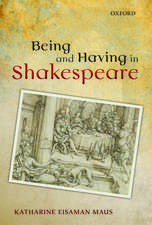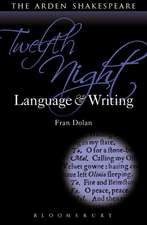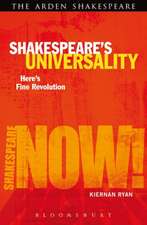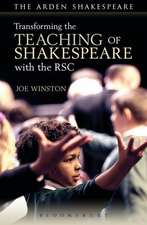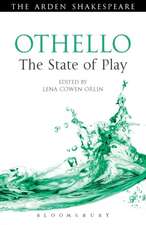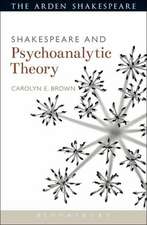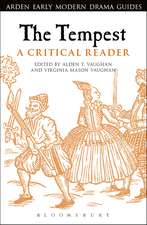Native Shakespeares: Indigenous Appropriations on a Global Stage
Autor Parmita Kapadia Editat de Craig Dionneen Limba Engleză Paperback – 28 noi 2016
| Toate formatele și edițiile | Preț | Express |
|---|---|---|
| Paperback (1) | 465.49 lei 6-8 săpt. | |
| Taylor & Francis – 28 noi 2016 | 465.49 lei 6-8 săpt. | |
| Hardback (1) | 1057.09 lei 6-8 săpt. | |
| Taylor & Francis – 26 iun 2008 | 1057.09 lei 6-8 săpt. |
Preț: 465.49 lei
Nou
Puncte Express: 698
Preț estimativ în valută:
89.07€ • 92.100$ • 73.72£
89.07€ • 92.100$ • 73.72£
Carte tipărită la comandă
Livrare economică 04-18 aprilie
Preluare comenzi: 021 569.72.76
Specificații
ISBN-13: 9781138278417
ISBN-10: 1138278416
Pagini: 258
Dimensiuni: 156 x 234 x 14 mm
Greutate: 0.36 kg
Ediția:1
Editura: Taylor & Francis
Colecția Routledge
Locul publicării:Oxford, United Kingdom
ISBN-10: 1138278416
Pagini: 258
Dimensiuni: 156 x 234 x 14 mm
Greutate: 0.36 kg
Ediția:1
Editura: Taylor & Francis
Colecția Routledge
Locul publicării:Oxford, United Kingdom
Notă biografică
Craig Dionne is Professor of English Literature at Eastern Michigan University, USA. Parmita Kapadia is Assistant Professor in the Department of Literature and Language at Northern Kentucky University, USA.
Recenzii
'Native Shakespeares advances conversations about the local as well as global "habitation" of Shakespeare. The essays assembled here illuminate the intimacies that have been forged between Shakespeare's works and diverse communities and individuals. They amplify the voices of intellectuals, activists, performers, writers and others - including prison inmates - who both undercut and forge the global Shakespeare industry.' Ania Loomba, Univesity of Pennsylvania, USA 'Lively and expansive, this collection tracks Shakespeare’s unexpected travels across the globe and through a range of social practices. From Québec to Havana, Bombay to Sudan, these essays locate Shakespeare at the center of the most important nationalist and postcolonial debates about identity, democracy, the legacy of colonialism and the growth of nation states. Native Shakespeares is a timely and insightful reminder of the enduring, but always changing, legacy of the bard.' Claire Sponsler, University of Iowa, USA and author of Ritual Imports: Performing Medieval Drama in America ’...interesting, exciting scholarship...Recommended.’ Choice ’Strong contributions from a variety of scholars working in a variety of fields, an introduction and afterword that stand as excellent essays in and of themselves, and a sense of cohesion rare in essay collections make this volume a worthwhile addition to the field.’ Borrowers and Lenders '... this book is a worthwhile contribution to our continuing critical fascination with global appropriations of Shakespeare. ' Sixteenth Century Journal 'This is an excellent collection of twelve essays, plus introduction and afterword. It is stimulating, erudite, and very readable. Most importantly it has coherence and the links between the essays make this a very useful and worthwhile collection. ... It is also a consistently high-value volume in that, to my mind, each essay clearly deserves its pages in the volume.' Parergon
Cuprins
Introduction, Craig Dionne, Parmita Kapadia; Part 1 Lowly Subjects: Tranwsposing Tradition; Chapter 1 The Face in the Mirror: Joyce’s Ulysses and the Lookingglass Shakespeare, Thomas Cartelli; Chapter 2 Commonplace Literacy and the Colonial Scene: The Case of Carriacou’s Shakespeare Mas, Craig Dionne; Chapter 3 “The Forms of Things Unknown”: Richard Wright and Stephen Henderson’s Quiet Appropriation, John Carpenter; Chapter 4 The Fooler Fooled: Salman Rushdie’s Hybrid Revision of William Shakespeare’s Hamlet Through “Yorick”, Santiago Rodríguez Guerrero-Strachan, Ana Sáez Hidalgo; Part 2 Local Productions: Nationalism and Hegemony From the Third Space; Chapter 5 Jatra Shakespeare: Indigenous Indian Theater and the Postcolonial Stage, Parmita Kapadia; Chapter 6 Nationalizing the Bard: Québécois Adaptations of Shakespeare Since the Quiet Revolution, Jennifer Drouin; Chapter 7 An Aboriginal As You Like It: Staging Reconciliation in a Drama of Desire, Maureen McDonnell; Chapter 8 Movers and Losers: Shakespeare in Charge and Shakespeare Behind Bars, Niels Herold; Part 3 Translating Across: Between the National and the Cultural; Chapter 9 Shakespeare and Transculturation: Aimé Césaire’s A Tempest, Pier Paolo Frassinelli; Chapter 10 Twin Obligations in Solomon Plaatje’s Diphosho-phosho, Ameer Sohrawardy; Chapter 11 In Fair Havana, Where We Lay Our Scene: Romeo and Juliet in Cuba, Donna Woodford-Gormley; Chapter 12 “I am no Othello. I am a lie”: Shakespeare’s Moor and the Post-Exotic in Tayeb Salih’s Season of Migration to the North, Atef Laouyene; afterword Afterword: The Location of Shakespeare, Jyotsna G. Singh;
Descriere
Explored in this essay collection is how Shakespeare is rewritten, reinscribed and translated to fit within the local tradition, values, and languages of the world's various communities and cultures. Regardless of the medium-theater, pedagogy, or literary studies-Native Shakespeares examines how the persistent indigenization of Shakespeare's work complicates the traditional vision of his work as a voice of Western culture and colonial hegemony.

